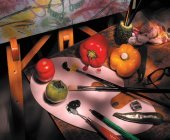|
Outdoor PortraitsOutdoor portraits of friends or relatives may be just for a record purpose, but these photographs are also shot for a commercial use. Let us not consider its usage, as any photograph shot for any purpose has to have a good pictorial appeal.
Portraits shot outdoors has good opportunities and challenges. However, as the subject is in your control, this genre, compare to wild life and sports photography, is easier. Isolation of person's face from the background is preferable. This will give importance to the facial expressions and other disturbing elements in back ground will go soft. For this, we have to use a wide aperture. However, if we use f 2.8 or f 4, we will have very shallow depth of field, limited to few centimeters. So use f 8 or f 11. Read more about which aperture to use. A viewer viewing a photograph will always look at the person's eyes first. So keep eyes in sharp focus. If you are not shooting at frontal angle of a face, then focus on the eye, which is closer to the camera. Soft light in form of open shade or overcast day is more preferable in outdoor portraits, but we can experiment with hard light, especially if the person has a masculine personality. However, we have to be within the latitude of the digital image sensor. Or we will get very dark and black shadows. In such case, take readings from the high light area and shadow area. The difference in terms of f stop should not exceed 3 stop. If it is more, then use a white reflector to compress the contrast ratio. This reflector can be in form of a white paper, cloth or readily available silver/white bounce. We can also use a day light fill in flash technique. Try to keep the face away from the sun. This will make the model more comfortable and he or she will give good expression without squinting. Be sure for the lens flare and use a good lens hood or block the sun with left hand palm. A moderate telephoto lens is more useful compared to a wide angle lens in outdoor portraits. Anything beyond 50 mm (on small frame digital camera) will compress the facial perspective in a pleasant manner. 200 mm lens will be better but we may have to use a camera support to avoid camera shake. A tele lens also will provide a comfortable distance from camera to the model. Camera setting on manual mode will give us more creative control but we can use aperture priority mode. Check the white balance setting to avoid unwanted color cast. To record a richer skin tone, keep the white balance setting on "open shade" or "cloud" Be sure of hanging cables and wires, poles or other distracting elements not coming in the composition. A lamp post or a pole should never appear like coming out of a person's head. Understand and evaluate the natural, available light. With little experiment, experience and practice, you will be able to capture the beauty of a human face in an astonishing way.
Learn more about Royalty free stock photography
Return back to Home Page from Outdoor portraits
|






